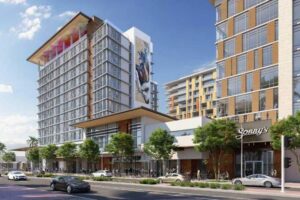By Corina Vanek | Arizona Republic
The barriers to building affordable housing can sometimes start even before a plot of land is chosen.
“When you look at most cities’ general plan maps, you will see almost no multifamily-zoned land,” said Dan Klocke, development project manager for affordable housing developer Gorman and Co.
“It’s a huge issue because then you have to go through a zoning case, and the cases can get pretty ugly.”
A zoning change requires multiple rounds of public hearings and approval from the City Council. Because land zoned for apartments is so difficult to come by, most apartment developers — affordable or not — need to go through the process before building a project.
The zoning change process is expensive. There are legal costs for a zoning attorney, money for hiring experts to write impact studies that answer questions like how the apartments will affect traffic, schools and the provision of public services, and staff time spent on various meetings and submittals.
Those expenses add up, and are no guarantee ground will be broken.
‘Apartment’ is a four-letter word
“It costs us $250,000 to $300,000 for a zoning case,” said Rob Lyles, co-founder and senior partner at Greenlight Communities, which develops apartments that it describes as “attainable” for renters. The company focuses on building properties for essential workers and doesn’t use government subsidies.
Lyles said Greenlight doesn’t even get to the point of a public hearing if it doesn’t feel confident it will get council support, simply because of the cost of the process.
Apartments can be permitted in areas with some commercial designations, but higher-density or taller buildings often require a zoning change. Even in a geographic area where a general plan — a city’s blueprint for future growth and development — might allow for apartments, a particular piece of land might not have the proper zoning.
Cities hesitate to give up commercially zoned land in favor of apartments, said Greg Vogel, founder and CEO of Land Advisors Organization, which aids companies in acquiring and developing land parcels for a range of uses.
“You don’t see a whole group of people going to city hall to speak in favor of apartment buildings,” Vogel said.
For a developer like Greenlight, finding land that already will accommodate apartments is ideal, but getting to be more difficult, Lyles said. Of the 10 projects Greenlight has in the pipeline, only one is on a site that already was zoned to allow apartments.
“As soon as I tie up a site, I’m checking the neighborhoods for opposition,” he said. “All zoning cases are hard, but some are really hard.”
Staunch opposition to apartment construction started in higher-end cities and neighborhoods, he said, “but now it’s become Valleywide.”
When Grady Gammage Jr., founding member of Gammage & Burnham, teaches law students, he tells them, “’Apartment’ is the longest four-letter word.”
“Apartments have always been hugely controversial in Phoenix,” he said. “There has always been intense antipathy toward apartments, but now it is much more organized.”
Gammage said City Councils around the Valley acknowledge the need for affordable housing and support the idea “in the abstract,” but that support can quickly change when the rubber meets the road.
Devastating’: When zoning cases go to the ballot
All zoning cases in Arizona are “legislative,” meaning they create a policy that will be applied in the future. The role of City Council members is to make a decision based on a subjective review of the case, specific to that case. All legislative decisions in Arizona are subject to referendum, meaning that constituents can petition to have the decision put on a future ballot.
“When I started as a zoning attorney, I don’t think we even realized zoning could be taken to referendum,” Gammage said. “It started to happen more in the ’80s, but it was for very high-profile cases. A referendum is just devastating to a developer. The election could be two years after the zoning case.”
While it’s rare for a case to get to the ballot, some of the Valley’s most controversial cases have been withdrawn when faced with the threat of a referendum.
Long before running for president, in 2004, Donald Trump planned a high-rise hotel and condominium development near 24th Street and Camelback Road. The Phoenix City Council narrowly approved the proposal, but opponents gathered enough signatures to force a referendum vote. Rather than hold an election, the council voted to reverse the decision and deny the project.

Artist rendering of failed Southbridge II concept.
More recently, in 2020, developer Carter Unger withdrew a plan to build a mixed-use project called Southbridge II along the canal in Scottsdale. The proposal had been approved by the Scottsdale City Council but elicited significant opposition from residents. Thousands of residents signed petitions to put the measure on a ballot, but the council opted to withdraw its approval of the project instead.
Some projects do prevail when put to a public vote. The Ritz Carlton Paradise Valley, which has been under construction for years, was subject to a referendum before the Great Recession. Voters ended up voting in favor of the resort, but plans were paused for a while during the economic downturn. Construction has come in stops and starts since.
Read More (subscriber content)
Some stories may only appear as partial reprints because of publisher restrictions.
Related: City Council Repeals Prior Approval for Huge Mixed-Use Project
